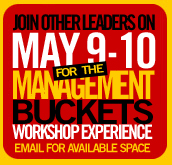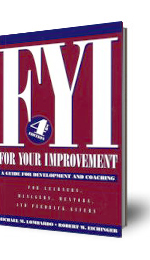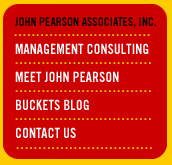
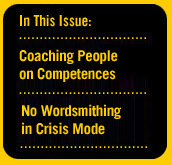
Issue No. 33 of Your Weekly Staff Meeting is another book and a bucket for the management library at your organization. For back issues of this eNews, go to my buckets blog at www.JohnPearsonAssociates.com.
No one team member has the whole package. Each of us has glaring weaknesses we ignore or try to mask. The leadership literature says we must build on our strengths and make our weaknesses irrelevant. Easy to do, until you glance over this week’s book detailing more than 100 competencies, performance dimensions, and career stallers and stoppers.
This add-water-and-stir book is amazingly simple, yet profound. FYI: For Your Improvement: A Guide for Development and Coaching (4th Edition) was written by feedback experts Michael M. Lombardo and Robert W. Eichinger.
It covers 119 skills (boss relationships, conflict management, hiring and staffing, humor, overmanaging, etc.) and details coaching helps for the unskilled, the skilled and the person who overuses each skill. After listing the causes of each specific problem, the guide gives 10 very practical remedies for each. Coaches and mentors will love this resource.
The authors, however, add this caution, “If you are still in denial, rationalizing, confused or being defensive about having any needs, seek additional feedback and counsel before using this book.” The authors have more resources for your team at Lominger International (a Korn/Ferry Company).
Your Weekly Staff Meeting Questions:
---------------------------------------------------------------------------------------------------
1. Are you a life-long learner? It’s easy to note improvement needed in others—but what about yourself? What’s your improvement plan?
2. Take 15 minutes, on your own right now and write Draft #1 of your 12-month personal development improvement plan. What formal and informal courses, workshops, coaching and resources do you need for developing your skills?
---------------------------------------------------------------------------------------------------
Insights from the Management Buckets Workshop Experience
Blogs and cable news networks have changed the rules for crisis management. If your organization, or one of your people, makes headline news for the wrong reason—how will you respond and how soon? (“No one from the organization responded to our calls or emails.”)
Thoughtful leaders plan for crises in advance. They can articulate their message in one sound bite and they have at least one well-trained spokesperson available 24/7 to the media. When you’re in crisis mode, it’s too late for wordsmithing.
Example: a recent opinion piece in the Wall Street Journal (The Charity Gap, April 4, 2007) suggested that donors should focus on the poor and redirect giving away from education, health and the arts. So if you’re the vice president of advancement and alumni relations at Wheaton College, Wheaton, Ill., how do you respond?
R. Mark Dillon, the Wheaton VP, clearly already had a well-reasoned case statement. His brilliant letter to the editor of the Wall Street Journal got top billing in the April 13, 2007, letters section.
If you’re skilled in The Crisis Bucket and the 19 other management buckets, stay home. If you’re not, join other leaders on May 9-10 at our Management Buckets Workshop Experience. Email me to check on available space.
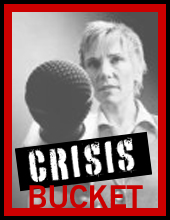
Your Weekly Staff Meeting Questions:
---------------------------------------------------------------------------------------------------
1.The Crisis Bucket. CNN calls our receptionist and asks him for a comment on a negative story that will air in 30 minutes. What are his CEO-approved instructions?
2. Here’s a microphone. Give us a 20-second sound bite on how our organization helps society.
---------------------------------------------------------------------------------------------------
Download the Management Buckets brochure
PS. Click “Forward Email” below to recommend this free eNews to a colleague.
